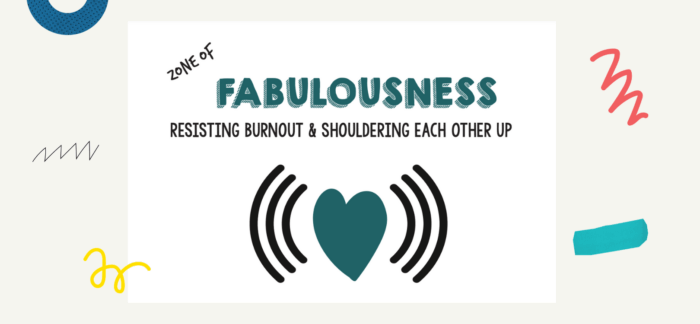Empowering Youth Workers Through Collective Care: 3 Takeaways from a Youth Work Teach-In
On December 7, 2023, I attended YouthREX’s online teach-in, Resisting Burnout and Vicarious Trauma: Collective Care and Solidarity, as a new member of the YouthREX team. The event featured Vikki Reynolds, a consultant, facilitator, and community worker, as the keynote speaker.
With a central focus on prioritizing the wellbeing of youth workers, this teach-in explored critical concepts, delving into why resisting burnout is crucial for sustained engagement and how to steer clear of negativity, cynicism, and disconnection.
Ending the session with a community dialogue provided an opportunity to learn tips directly applicable to practice. These insights were designed to support youth workers in refocusing their efforts on both young people and their own needs. At the same time, the conversation explored approaches to integrate collective ethics and collective care, nurturing a sense of solidarity among colleagues in the field.
As a qualitative researcher who is interested in issues of wellbeing and client/patient-centered practice, there were three key takeaways that really resonated for me:

01. Sustaining, Caring, and Focusing on Service: The Zone of Fabulousness
Vikki’s insightful framework, the Zone of Fabulousness, introduces a transformative approach for frontline responders, including youth workers. Rooted in social justice, this framework redefines workers’ responses to oppression by recognizing the ways workers may be harmed in their roles, diverging from traditional concepts of vicarious trauma (feeling emotional strain from hearing others’ trauma) or burnout (feeling exhausted from prolonged work stress).
The framework encourages a profound shift in perspective, urging workers to consider how they treat the people they see and whether they foster relationships of respect and dignity.
I like to think of the approach as a spectrum ranging from disconnection to enmeshment, and the ideal headspace for youth workers is the Zone of Fabulousness, positioned in the middle. Disconnection, characterized by projecting negativity and cynicism, involves the youth worker ‘playing the victim’. On the other end, enmeshment sees the youth worker ‘heroically posturing’ and struggling with maintaining boundaries.
The Zone of Fabulousness becomes the space where the people with whom we work are at the centre, and workers connect through collective ethics – providing support, instilling hope, and engaging in collaborative care.
Youth workers enhance the sustainability of their roles by intentionally immersing themselves in the Zone of Fabulousness.
The Zone of Fabulousness resonates with my commitment to ensuring that young voices are at the heart of my research. Vikki’s sentiments will serve as a reminder that collaborating with young people is not a burdensome task; instead, I can strive to develop mutually enriching relationships in which youth participants not only educate but also inspire and challenge me in positive ways.
Youth workers can consider specific actions aligned with Vikki’s insights, such as treating hope as a discipline by actively seeking it out, and prioritizing relationships of respect and dignity. By placing youth at the centre and fostering an environment where youth can feel empowered and safe to speak up, you can embody the principles of the Zone of Fabulousness in your everyday practices.
02. Reframing Self-Care as a Spirited, Sacred Relationship
In resistance to its overuse and co-optation by wellness trends, self-care can be reframed as a deliberate practice that contributes to genuine wellbeing. Shifting the perspective on self-care towards a spirited, sacred relationship is crucial as it emphasizes a focus on re-creation.
Vikki stressed that self-care can be both essential and inherently inadequate. Taking care of yourself is crucial, but it’s not a one-size-fits-all solution. It’s about figuring out what genuinely benefits you and what doesn’t.
However, it’s essential to be aware that self-care can sometimes be used against youth workers. Recognizing ‘vicarious trauma’, ‘compassion fatigue’, and ‘burnout’ as terms used by the trauma ‘industry’ is important.
Compassion isn’t something that can be worn out; it’s a positive force rooted in personal experiences. This shift in perspective is significant because it challenges industry-created measures rooted in oppressive, capitalist systems and emphasizes the enduring and generative nature of compassion in our lives.
Youth workers should remember that alignment with the core values and ethics of your work, coupled with a commitment to collective care, can pave the way for long-term sustainability.
This approach not only safeguards your own wellbeing, but significantly enhances your capacity to provide meaningful and effective support to youth. Ultimately, the nature of personal and collective wellbeing in youth work is interconnected, since the wellbeing of individual youth workers is crucial to the success and sustainability of the entire youth work community.

03. Building a Support System
In the challenging world of youth work, youth workers must build strong support networks to help navigate the difficulties that come with their roles, enhance their feelings of resilience, and create a collective strength that benefits everyone in the supportive network.
Vikki shared three practical ways to implement this vital aspect of wellbeing:
i) Knowing your Collective Care Circle involves identifying individuals both within and outside your workplace who positively contribute to your overall wellbeing. This concept encourages reflection on the question, “Who and what shoulders you up?” — a sentiment vividly captured by Vikki, who emphasized that in moments of self-forgetfulness, a supportive community can serve as a powerful reminder.
“If I forget to love myself, remind me,” was a line expressed by spoken word poet and writer David Delisca – one of two artists who performed during the event (the other being Shahaddah Jack) – which beautifully reinforces the importance of a supportive community in bolstering individual wellbeing.
ii) Forming a Solidarity Team entails creating a network of like-minded individuals with common goals and values. Originating from Vikki’s experiences in working with survivors of torture and political violence, the Solidarity Team functions as a community of support, challenging isolation and individualization in this difficult work. Youth workers are encouraged to construct their own Solidarity Teams, carrying that team into their work in both imagined and actual ways.
iii) Designating a “Howl at the Moon” Person involves establishing a connection with someone you call upon in times of distress. This trusted person not only understands what you don’t want but is prepared to offer support in ways that make sense to you; a crucial pre-emptive measure is to stress the purpose of why you need this person in your corner and what kind of help you need from them.
As a Brown Muslim woman, I am well aware of what I don’t need during emotionally challenging times — such as unwarranted wellness check-ins by the police and the labelling and pathologizing of my feelings. Instead, I desire the space to feel my feelings, then move on.
Youth workers can remember this line from Vikki when she described revolutionary love (as conceptualized by Paulo Freire in Pedagogy of the Oppressed): “Revolutionary love is a commitment to others and a solidarity with their cause.”


